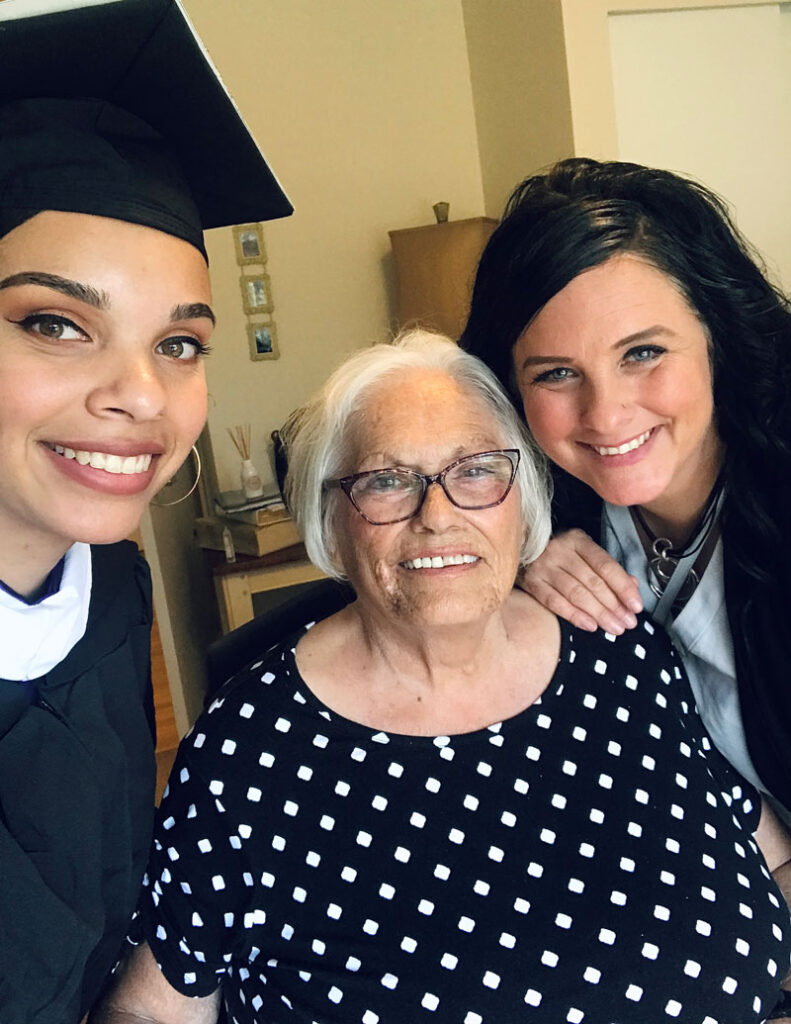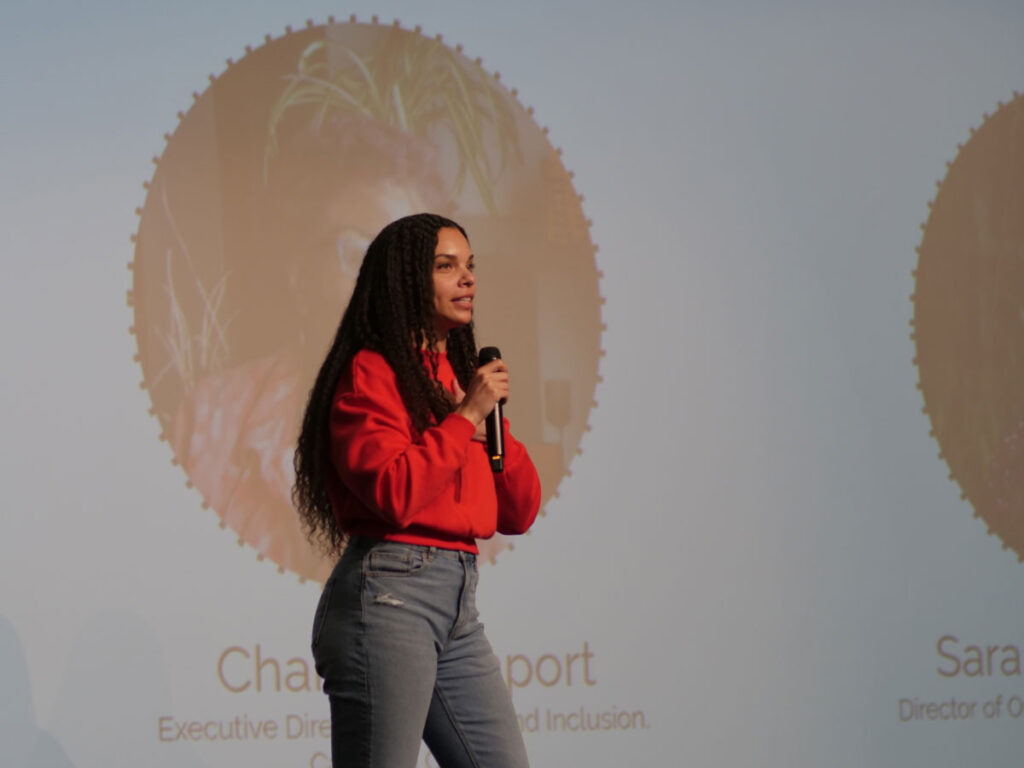Ayva Thomas always excelled when it came to school work. Despite this, and despite growing up in a family of educators in Mukilteo, Washington, she never saw herself pursuing a career in education.
Coming up through the west side of the Mukilteo School District, Thomas was often one of the only Black students in her classes, and it affected the way she viewed academics.
“I didn’t love my personal experience as a student,” said Thomas, a University of Washington Bothell alumna who received her bachelor’s in Community Psychology in 2017 and her master’s in Cultural Studies in 2019. “Although I had several wonderful teachers along the way, it rarely felt like my identities were reflected in class. I was ‘good’ at school but found myself experiencing more stress than joy.”
It wasn’t until she was working toward her bachelor’s degree that she began to think differently. Today, as interim executive director of racial and educational justice for the Northshore School District, she celebrates and is humbled by the opportunity to contribute to advancing transformative change in education.
A shift in thinking
Attracted to the small campus feel and small class sizes, Thomas began studying Community Psychology at UW Bothell thinking she might like to become a sport psychologist. She wasn’t sure what she wanted to do, but her mother had taught her college was the perfect place to explore the possibilities.
She began taking classes with strong themes of diversity and social justice, Thomas recalled, and noticed a shift in her thinking around both education and her career goals. “I learned more about justice in various forms and then applied that to my own experience,” she said. “As I acquired the tools to be an agent for change, I went from solely thinking about education for what it currently was to dreaming about what it could be and how to get there.”
During a project for a course centered around social change called “Approaches to Social Research,” Thomas got the idea for a program focused on talking to students about college not only in high school but also in middle school — in particular, for students who would be first-generation college students.
After doing research for the class, Thomas also wanted to put her idea into practice.
“My mom just so happens to be a seventh-grade teacher, and she had a significant population of students who would be the first in their family to go to college,” Thomas said. “I felt like that was the perfect opportunity to combine education with family and community.”
Her idea soon became a reality as she and other students from UW Bothell visited Voyager Middle School in Everett, Washington, to talk about their college experiences.
Supported by community
After receiving a request for T-shirts to send to middle school students who wrote letters to then-chancellor Wolf Yeigh as part of the Voyager outreach program, Lisa Youngblood Hall, director of media relations and communication for UW Bothell at the time, wanted to help.

“As a first-generation college student, I thought, ‘We can do better than that,’” Youngblood Hall said. “We had an opportunity to have a real impact on the students’ future, and I didn’t want to leave it up to a delivery of T-shirts in the mail.”
She proposed that the chancellor visit the students in person so he could share his educational journey and career path — and, yes, bring some T-shirts along, too. The chancellor continued to visit the school for a number of years, and the North Star Mentorship Program also expanded to bring the students to campus for a day of mock classes.
“I felt truly supported by that work,” Thomas said. “Everything about the development and implementation of North Star was such a beautiful thing to see come together. It reminded me of the critical importance of valuing and building community within our own communities.”
One of the highlights of her experiences, Thomas said, was when she was graduated with her bachelor’s degree and the University provided her mother’s students with tickets to the Commencement ceremony.
“Most of them had never been to a college graduation, and they got to experience it firsthand,” she said. “It was amazing to be able to look into the crowd and see all of them cheering and holding signs. It felt like a full circle moment for me — and it truly felt impactful for them in that quite a few ended up having a deep interest in going to UW Bothell as well.”
The aha moment
After graduation, Thomas found herself again unsure of what she wanted to do next when her mother sent her a job description for a director of diversity and equity position in the Edmonds School District. That’s when something clicked.
“I had never heard of that career option before,” she said. “I read through it and thought, this is exactly a role that I want to pursue.”
It was not required for such a position, yet a master’s degree seemed like the next logical step toward achieving her new career goal, so Thomas began the Cultural Studies program at UW Bothell that fall.
“I felt like I had a great starting place during my undergraduate studies,” she said. “I wanted to be able to deepen that knowledge from an academic perspective but to also extend a practice-based perspective as well.”
While working on her graduate degree, Thomas began emergency substitute teaching in Mukilteo and was then hired as an equity and diversity assistant at the Northshore School District in March 2018 after being connected to the position by a familiar face — Lisa Youngblood Hall, who was then the district’s director of communications.
Later that year, Thomas helped establish the foundation for what is now the district’s Racial and Educational Justice Department. “I was able to apply the concepts that I was learning in my master’s program directly to the work that I was doing in Northshore and have it be a reciprocal relationship between school and career, between theory and practice,” she said.
I was able to apply the concepts that I was learning in my master’s program directly to the work that I was doing in Northshore and have it be a reciprocal relationship between school and career, between theory and practice.
Ayva Thomas, Community Psychology ’17, Cultural Studies ’19
Putting students first
Thomas has now been with Northshore for almost six years and is currently serving as interim executive director of racial and educational justice.
One of her proudest achievements has been her leadership and work as part of a team to implement ethnic studies across the district. What makes this body of work special, she said, was that it came about not because of a state or federal requirement but rather developed organically with a group of teachers.
In all aspects of her work, students are the focal point, Thomas said. “My work with students is what brings me the most joy, and I think that’s where the heart of the work is. I learned very early on that this work can’t happen for kids — it must happen with kids.”
Indeed, Thomas believes that education is a two-way street. “I learn from students every day,” she said. “When asked, ‘What do you want to be when you grow up?’ one student said, ‘I don’t know what I want to do, but I know how I want to feel.’
“That was one of the most powerful things I’ve learned from a student.”

Staying involved
Another pillar of her work at Northshore, Thomas said, is engaging with community partners, including her alma mater. Through her role, she has remained involved with UW Bothell, particularly through Community-Engaged Learning & Research initiatives.
“The most rewarding part of my work is collaborating with youth and getting to build relationships with them — educate and lead alongside them, and learn from them,” she said.
She recalled one such conversation with a Black student who commented that she didn’t love her natural hair. “For me to be able to listen to that student and then share my own experiences going through school not feeling like my hair was beautiful as it grew naturally was powerful,” she said. “In that conversation, I had a moment where I was talking to my younger self and was able to say, ‘Our hair forms our crowns, and each strand curls together the stories of our ancestors, our true histories and our collective legacies.’
“To see that student’s facial expression change and the crack of a smile appear as she processed that community-based knowledge … Those are the moments that are the most rewarding to me.”
Ever eager to know and do more, Thomas is now enrolled in the UW’s Leadership for Learning Program and will graduate with a doctorate in education and superintendent certification this June.
Learn more about Ayva Thomas’ role in furthering racial and educational justice at the “Social Justice Career Panel” discussion on Monday, Jan. 22, 2024. The panel will take place at the North Creek Events Center from 3:30 to 5:30 p.m. The event is free and open to all.




